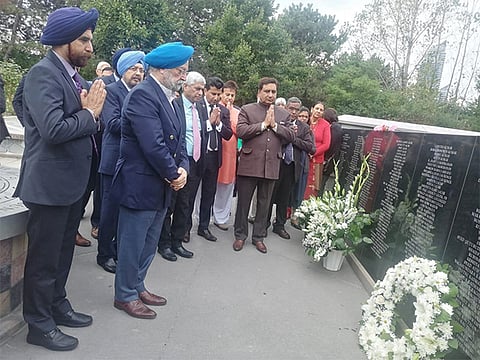

CHANDIGARH: Two-thirds of Canadians believe details of the Kanishka Air India flight bombing in 1985 by Khalistani extremists in which 280 Canadian citizens and 49 others died should be part of the school curricula, while seven in ten say an exhibit on it should be created at the Canadian Museum of History.
The findings were made by a new survey conducted by the non-profit Angus Reid Institute (ARI), published on the 40th anniversary of the bombing on June 23. "Today marks 40 years to the day that Canada endured the worst terror attack in its history, but if you ask most Canadians, there’s a good chance they’d be unable to tell you that. On June 23, 1985, 280 Canadian citizens and 49 other people died when an explosion caused by a bomb brought down Air India Flight 182 on its way from Canada to London, England."
"New data from the non-profit Angus Reid Institute finds few Canadians, approximately one-in-five (17 per cent), able to identify the Air India bombing as the deadliest terror attack Canada has endured. Further, just one-in-10 (9 per cent) say they know a lot about the incident, while one-third (32 per cent) had never heard of it," said the ARI.
"There is larger agreement that the tragedy has never been treated as a national one by Canada. Half (51 per cent) believe the bombing "has never been treated like a Canadian tragedy", a proportion that grows among those who know a lot (60 per cent) about the incident. There is appetite among most Canadians for more to be done to educate the country about the incident," it added.
The statement further reads, "For half of the population, the feeling is that Canada has never truly treated this incident as a national tragedy. One-in-three (32 per cent) are unsure, while 17 per cent disagree. Among those who know a lot about the history of the incident, twice as many (60 per cent) say it has not been treated as such, as say it has (32 per cent)."
"While they may not know a lot about the tragedy, Canadians appear to see this as a problem to correct. Two-thirds (66 per cent) say they support Canada implementing information about the tragedy into school curricula, while seven-in-10 (71 per cent) would create an exhibit in the Canadian Museum of History. Both would go a long way to increase the number of Canadians in future years who feel Canada has done enough to honour the victims. In both 2023 polling and these latest data, fewer than three-in-10 said enough had been done," it added.
All 329 people aboard the flight that departed from Montreal died when a bomb exploded aboard the plane off the coast of Ireland. The vast majority -- 280 -- were Canadian citizens, and one-quarter of the victims were children. There have been trials and investigations, a public inquiry into the Canadian government’s handling of the aftermath, the establishment of the National Day of Remembrance for Victims of Terrorism in 2005, and an official Canadian government apology in 2010. But that has not amounted to broad knowledge of what is the deadliest act of terrorism in Canadian history.